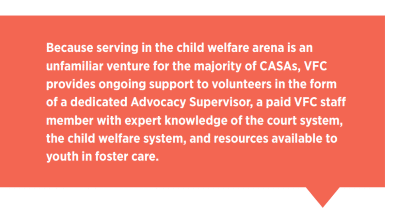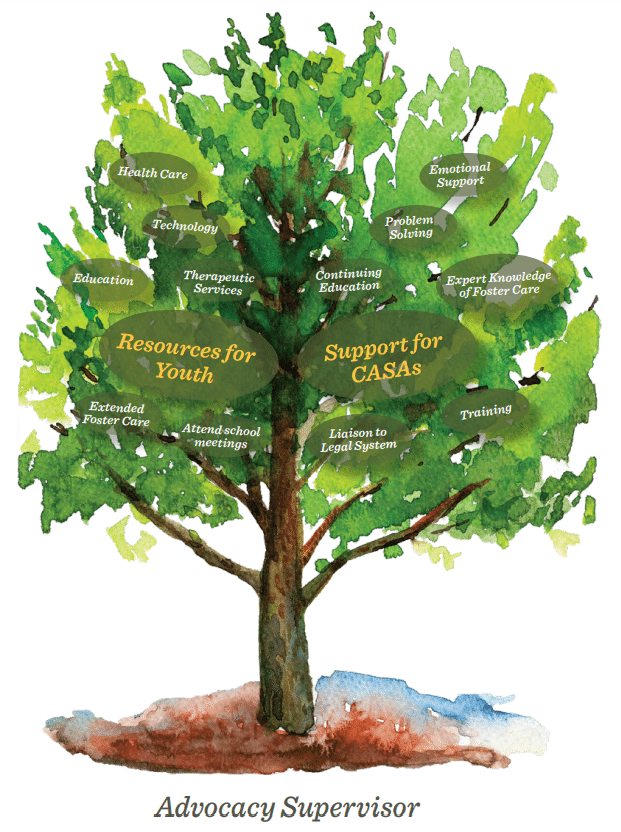Rooted in Service
The Role of an Advocacy Supervisor
Court Appointed Special Advocate (CASA) volunteers Niza and Sylvia, who together are assigned to five children in the same family, were concerned to learn the water in the mobile home park where the family lives was contaminated with arsenic and not suitable for drinking, washing, or bathing.
Their initial thought was the call the news, contact a politician, or otherwise bring the issue to the public’s attention. Instead, they contacted their Advocacy Supervisor, Brianna Miller, who while validating their feelings, reminded them of their responsibility to protect the family’s privacy. Brianna shifted their focus to helping the family find more suitable housing and provided the CASAs with contact information for a housing specialist with the county. The CASAs then facilitated contact between the children’s mother and this resource. After working together for nearly a year, the family of nine is moving into their new home with more space and, most importantly, healthy drinking water.
This story is just one example of many illustrating the support provided to CASA volunteers by their Advocacy Supervisors at Voices for Children (VFC).
 The role of a CASA is a unique opportunity, one in which volunteers work alongside professionals in the child welfare system, including attorneys, social workers, and dependency law judges. One of the amazing things about the CASA program is it is open to any member of the community who has the heart to help children. Because serving in the child welfare arena is an unfamiliar venture for the majority of CASAs, VFC provides ongoing support to volunteers in the form of a dedicated Advocacy Supervisor, a paid VFC staff member with expert knowledge of the court system, the child welfare system, as well as resources available to youth in foster care. Advocacy Supervisors act as roots to keep CASAs grounded but also provide the support, knowledge, and resources, which nurture growth in their advocacy role.
The role of a CASA is a unique opportunity, one in which volunteers work alongside professionals in the child welfare system, including attorneys, social workers, and dependency law judges. One of the amazing things about the CASA program is it is open to any member of the community who has the heart to help children. Because serving in the child welfare arena is an unfamiliar venture for the majority of CASAs, VFC provides ongoing support to volunteers in the form of a dedicated Advocacy Supervisor, a paid VFC staff member with expert knowledge of the court system, the child welfare system, as well as resources available to youth in foster care. Advocacy Supervisors act as roots to keep CASAs grounded but also provide the support, knowledge, and resources, which nurture growth in their advocacy role.
After completing Advocate University and starting their first case, it’s natural for a CASA to have a lot of questions. Their Advocacy Supervisor gives them all the information they need and helps them feel more confident. CASA volunteers experience a range of emotions while working with their assigned youth, who are in foster care because they have experienced abuse, neglect, and other forms of trauma. Advocacy Supervisors provide a listening ear for CASAs as they work through their own feelings of frustration, sadness, or joy. This is especially helpful because CASAs are not allowed to talk about their cases with friends or family because of confidentiality. As CASAs navigate the child welfare system and difficult situations arise, Advocacy Supervisors act as a sounding board, assisting CASAs to plan their next steps. Advocacy Supervisors also facilitate continuing education opportunities for CASAs, including small group meetings that provide CASAs a platform to share case successes and concerns with their peers, reminding them they are part of the team. As one Advocacy Supervisor described, the Advocacy Supervisor is the CASA’s “biggest fan and cheerleader.”
With expertise in the child welfare system, Advocacy Supervisors accompany CASAs to many case-related meetings and court hearings. These can be intimidating experiences for a layperson who likely has never stepped foot in a courtroom or sat at a table full of professionals as they develop a student’s individualized education program (IEP). The Advocacy Supervisor prepares the CASA for the purpose and format of each meeting, provides support during the meeting, and debriefs the CASA about what took place after the meeting.
Over time, CASAs become more engaged and comfortable in their role, and their questions become more specific and technical. For example, an assigned child may move from a group home to a foster home or be returned to the care of their biological parents. A child may be approaching their 18th birthday or moving to a home outside of the county. Advocacy Supervisors prepare CASAs for how their role will evolve and what they can anticipate in various scenarios. Each child’s case is unique and brings a new challenge, so Advocacy Supervisors often liaise between a CASA and the legal and child welfare systems and help to identify from whom and to whom they can obtain and provide information, as appropriate.
Advocacy Supervisors are in regular contact with their CASAs. During these conversations, CASAs share any unmet needs of their children. Advocacy Supervisors are well-informed of the services available for youth in foster care. They provide CASAs with fun outing ideas, valuable resources for parenting youth, housing options for young adults in extended foster care, and nonprofit partners who provide items to enrich the children’s lives. CASAs most commonly turn to their Advocacy Supervisors to identify resources to support their youth in the following areas:

• HEALTH CARE: Mental health services, orthodontia programs, developmental services, help navigating Medi-Cal and Medicaid, and substance abuse treatment
• EDUCATION: Tutoring services, help with IEPs, and connections to school district liaisons for foster youth
• TECHNOLOGY: Access to cell phones, computers, and iPads
• TRANSITIONAL AGED YOUTH (TAY): Employment and community service opportunities, job programs, and independent living program services
Voices for Children is built around supporting its volunteers so they can best advocate for children in foster care. Whenever a CASA has a question, concern or feeling, they go to their Advocacy Supervisor. If they need assistance in contacting a professional or obtaining information for their court report, they go to their Advocacy Supervisor. If an order of the Court has not been fulfilled or their child is not receiving the appropriate services, they go to their Advocacy Supervisor. This partnership between CASAs and their Advocacy Supervisors keeps CASAs anchored and strong and enables them to provide the best possible advocacy and support for the children they serve.

 CASAs in Court: How Volunteers put Advocacy into Action
CASAs in Court: How Volunteers put Advocacy into Action